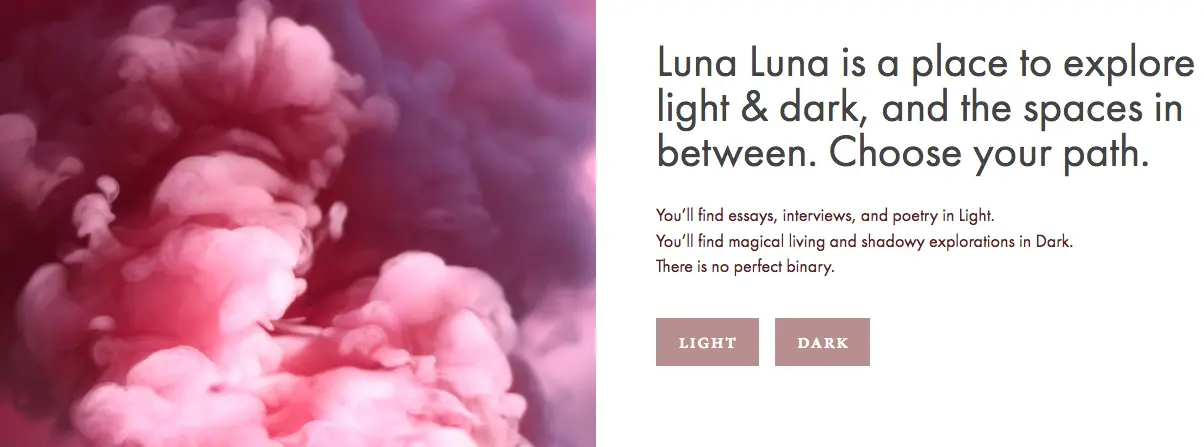About five years ago I got published in an anthology with James Franco. I thought it would really put my name out there, but all it did was make me look cool to other young writers on Facebook. One of those writers was Lisa Marie Basile, who ended up becoming my friend and a colleague who I really admire. To celebrate our friendship and the release of her new book, we talked about poetry, casting spells, and upcoming projects—as we have better things to talk about these days than James Franco.
Can you first do a spell that this interview goes well? Do spells work like that? I guess that leads me to my first question: what is witchcraft to you?
Fuck, yes. Okay, done!
I think magic works like that, yes, actually—magic is just a way of directing or redirecting energy, which I explain in my new book, Light Magic for Dark Times. I think our thoughts are engines, and that is a form of magic. If I think something will go well, that puts the wheels in motion, so to speak. I used to study witchcraft—more specifically, Wicca, when I was a lot younger. For a long time, I lost my connection to it because I couldn’t figure out what worked for me.
I didn’t realize it then, but I was more intuitive and chaotic about my magic, but it was magic. It was an energy, a force. I mostly didn’t want to involve ceremony or elaborate tools. I preferred integrating it silently into my life—using my intuition, casting my thoughts into reality by writing them or visualizing them, lighting a candle and charging an object as something that could give me strength or confidence. I absolutely, though, respect the many witches whose lives have been devoted to deep study or initiation or ancestral work, as well. There are so many ways to make magic.
What do poetry and casting spells have in common?
Poetry is the examination of the in-between; it’s the liminal space between reality and artifice, of the musical and the structured, the internal and how it’s being interpreted. It’s a translation of our reality. Spells are, too. They bridge the gap between want and have, between seeing and not seeing, between inhabiting and distance. It’s about making something new out of nothing, or about using a seedling to create a garden.
You’ve been an editor for Vitamin Shoppe but you’re also curating a spell book. Do you think science and magic can co-exist and compliment each other?
I absolutely do! I myself am fairly skeptical. I’d call myself secular, really. I’ve called myself a staunch atheist, a witch, an empath, a skeptic. My process and path have changed a lot, and that’s okay. I still do not believe in gods or divine entities, but I do believe in energy and matter; I think there’s beautiful magic in that—that what we think or feel becomes reality. My book states clearly that magic should be a tool in one’s arsenal, and that seeing a doctor or therapist in addition to working self-care magic is key.
I think we divorce magic from science, but to me they are the same. The trees, the sky, the water—they all communicate and move and grow. They foster life and can end life. We are of them and they feed us. When we die, we go back into the natural essence of life. Meditation, breathing, movement—these are all ways we connect, and that is magic, to me.
I know there are a lot of “thoughts are things” platitudes out there; I also recognize that this is loaded with privilege and it’s not quite as easy as that. But setting intentions do work, and belief is a powerful thing. It will manifest differently for each of us. That’s beautiful to me.
As a writer—of nonfiction and poetry and other works—my goal has really always been the same: excavate the pain and transform it. Tell the story of the self. Make beauty! Magic and writing are sort of the same in that way.
Can language itself be a spell? If so what writer is your favorite spell caster?
Language is a spell. What we write, in a way, becomes. I was just talking about this with Andrew Byrds of Entropy in our chat.
I think my favorite spell-caster poet would have to be Marosa di Giorgio. She calls upon the natural world in all of her work, and she reclaims her story and memories with beautiful and vivid language. That reclamation and exploration and self-truth is transformative.

Has running Luna Luna Magazine influenced writing this book?
Luna Luna started five years ago as a way to explore one’s light and dark—neither good nor bad, simply the hidden or obscure, and the more open. I have always been enamored with how the two create one: how what we present and what we hide shapes us, how our vices make us who we are, how what we do in the shadows can become beautiful and light. I called upon that in my book: I wanted the reader to feel, when they read Light Magic for Dark Times, that their selves, including their shadows, can be used for good and for mapping a way to enlightenment or at least empowerment.
You are writing and curating different genres. What is your favorite genre to write in and what is your favorite to curate?
It’s like picking a kid I like the best. I want to say poetry is my oldest child and the one, if you asked me on my death bed, I'd say I loved the most. But nonfiction, my other child, is also my beloved. I think my brain wants to say I prefer nonfiction because it allows me so much expanse to work in and purge myself of old haunting memories, but it’s poetry’s weird, nonlinear, permissive glory that I always come back to. The fun news is that so many amazing indie magazines and journals allow for the merging and erasure of genre. I would like to say that my book, which is forthcoming from CLASH Books, is a blending of genres; it’s fiction, but poetry is its blood. I love reading that genre-blur in other writers’ work. It’s so important to say fuck it.
Why do you believe there is a resurgence of beliefs in witchcraft and astrology in this decade?
I think there’s a tidal ebb and flow; we lose connection with the natural world and then we gain it. We find beauty and power in ideas of magic and self-development, then we focus on other things. Our species tends to do things in waves, and that’s OK. There’s always going to be consistent practitioners, and our beliefs and needs change, as individuals, over time, as well.
There’s definitely a trendiness to it all—you can see that in shows and shops and fashion. But my thinking is, if it’s done with respect and consciousness, it can make a space for people who feel disenfranchised or invisible to connect with their inner power and to take time to de-stress and find autonomy. That is not a bad thing, and this is a legacy that has been well-documented.
I got this book from my wife, Leza, because she loves learning about magic and spells. Why should readers get this book?
Readers who are already interested in magic will find this grimoire to be accessible, modern, inclusive, feminist, and easy. It can be used as one tool in someone’s arsenal, or as a guidebook for self-care practices, specifically.
Readers who are new to magic or simply want to make a habit out of or ritualize their self-care will find that this book helps them tap into their most authentic selves. It lets the reader be the guide, and functions as a prompt and a friend. I wrote it with compassion for those who experienced trauma, have a hard time connecting to their bodies, or have a need to go deeper in their self-exploration. And, it’s got a writing magic chapter for all my writer friends!
Finally, what you are working on right now?
Well, I’ve got a poetry collection coming out with Inside The Castle—it’s called Nympholepsy (co-written with Alyssa Morhardt-Goldstein) and a novella coming out with, well, YOU. It’s about a girl who falls into the abyss of grief by using sex as a conduit.

About the author
Christoph Paul is the Managing Editor and owner of CLASH Books, who have published over 60 books and have been covered by NPR, Poets & Writers, Rolling Stone, Believer Magazine, Oprah Magazine, The Observer, Fangoria, and Publisher's Weekly. The press has had books translated into Spanish, French, and Italian. He has been editing books in almost every genre for over a decade. As an author, he won a humor award and had viral cult success under a pen name. He is the lead singer and bass player of the rock band The Dionysus Effect, who have received positive reviews in Loudwire, EARMILK, and Red Rock Magazine. He sometimes writes songs about the books he publishes because even artists are inspired by their day jobs. Follow him on Twitter @christophpaul_ @clashbooks @dionysuseffect.







